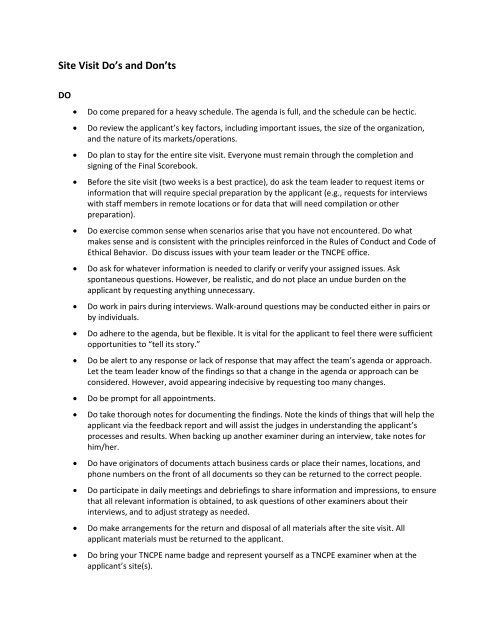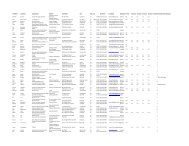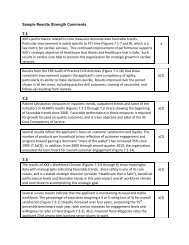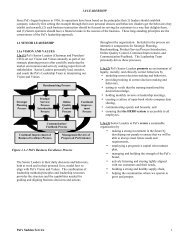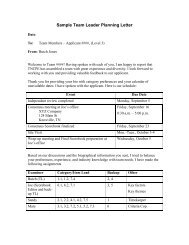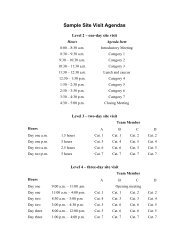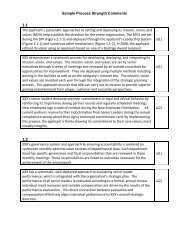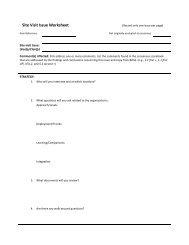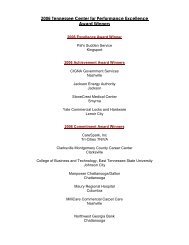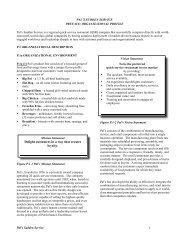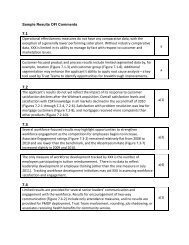Site Visit Do's and Don'ts.pdf
Site Visit Do's and Don'ts.pdf
Site Visit Do's and Don'ts.pdf
You also want an ePaper? Increase the reach of your titles
YUMPU automatically turns print PDFs into web optimized ePapers that Google loves.
<strong>Site</strong> <strong>Visit</strong> Do’s <strong>and</strong> Don’ts<br />
DO<br />
• Do come prepared for a heavy schedule. The agenda is full, <strong>and</strong> the schedule can be hectic.<br />
• Do review the applicant’s key factors, including important issues, the size of the organization,<br />
<strong>and</strong> the nature of its markets/operations.<br />
• Do plan to stay for the entire site visit. Everyone must remain through the completion <strong>and</strong><br />
signing of the Final Scorebook.<br />
• Before the site visit (two weeks is a best practice), do ask the team leader to request items or<br />
information that will require special preparation by the applicant (e.g., requests for interviews<br />
with staff members in remote locations or for data that will need compilation or other<br />
preparation).<br />
• Do exercise common sense when scenarios arise that you have not encountered. Do what<br />
makes sense <strong>and</strong> is consistent with the principles reinforced in the Rules of Conduct <strong>and</strong> Code of<br />
Ethical Behavior. Do discuss issues with your team leader or the TNCPE office.<br />
• Do ask for whatever information is needed to clarify or verify your assigned issues. Ask<br />
spontaneous questions. However, be realistic, <strong>and</strong> do not place an undue burden on the<br />
applicant by requesting anything unnecessary.<br />
• Do work in pairs during interviews. Walk-around questions may be conducted either in pairs or<br />
by individuals.<br />
• Do adhere to the agenda, but be flexible. It is vital for the applicant to feel there were sufficient<br />
opportunities to “tell its story.”<br />
• Do be alert to any response or lack of response that may affect the team’s agenda or approach.<br />
Let the team leader know of the findings so that a change in the agenda or approach can be<br />
considered. However, avoid appearing indecisive by requesting too many changes.<br />
• Do be prompt for all appointments.<br />
• Do take thorough notes for documenting the findings. Note the kinds of things that will help the<br />
applicant via the feedback report <strong>and</strong> will assist the judges in underst<strong>and</strong>ing the applicant’s<br />
processes <strong>and</strong> results. When backing up another examiner during an interview, take notes for<br />
him/her.<br />
• Do have originators of documents attach business cards or place their names, locations, <strong>and</strong><br />
phone numbers on the front of all documents so they can be returned to the correct people.<br />
• Do participate in daily meetings <strong>and</strong> debriefings to share information <strong>and</strong> impressions, to ensure<br />
that all relevant information is obtained, to ask questions of other examiners about their<br />
interviews, <strong>and</strong> to adjust strategy as needed.<br />
• Do make arrangements for the return <strong>and</strong> disposal of all materials after the site visit. All<br />
applicant materials must be returned to the applicant.<br />
• Do bring your TNCPE name badge <strong>and</strong> represent yourself as a TNCPE examiner when at the<br />
applicant’s site(s).
• Do wear comfortable clothing appropriate for the types of facilities you will visit <strong>and</strong> the off-site<br />
team sessions where discussion <strong>and</strong> writing occur.<br />
• After the Feedback Report is delivered to the applicant, the team leader will let you know it’s<br />
time to delete your files. All notes, drafts, Consensus Scorebooks, drafts of <strong>Site</strong> <strong>Visit</strong> Issue<br />
Worksheets, applications, <strong>and</strong> flip chart pages must be shredded. All digitally stored material<br />
about the applicant must be deleted.<br />
DON’T<br />
• Don’t bring or wear clothing or other items that feature TNCPE logos.<br />
• Don’t contact the applicant before the site visit unless you are the team leader or backup<br />
team leader.<br />
• Don’t depart before the Final Scorebook is finished <strong>and</strong> signed.<br />
• Don’t take cameras or video recorders to the applicant’s site(s).<br />
• Don’t discuss any of the following with the applicant:<br />
o personal or team observations, findings, conclusions, or decisions, whether in a<br />
critical or complimentary way<br />
o practices of other applicants<br />
o team observations about other applicants<br />
o information about your own organization<br />
o your personal or professional qualifications<br />
o names of or any other information about other applicants<br />
• Don’t give verbal or nonverbal feedback during interviews. Do not let the applicant’s<br />
representatives know your evaluation of their answers.<br />
• Don’t interview consultants, customers/students/patients, or suppliers unless an exception<br />
has been identified by your team leader in consultation with the TNCPE office.<br />
• Don’t interact with the applicant after leaving the site.<br />
• Don’t take applicant materials, reports, documentation, etc., off-site.<br />
• Don’t leave for home with any of the applicant’s materials.<br />
• Don’t accept gifts of any sort.<br />
• Don’t bring family members or friends on site visit trips.<br />
• Don’t hold debriefings, meetings, or discussions of the site visit in an open area.


